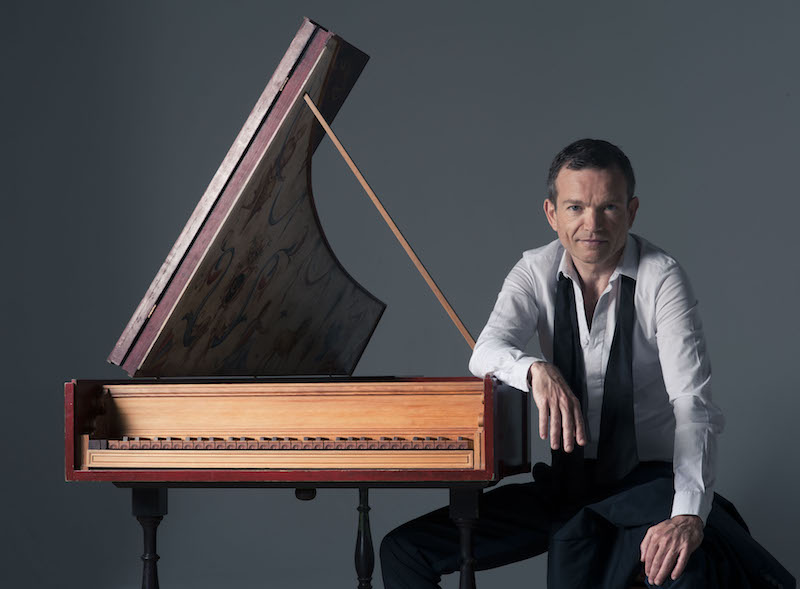Piau, Les Talens Lyriques, Rousset, Wigmore Hall | reviews, news & interviews
Piau, Les Talens Lyriques, Rousset, Wigmore Hall
Piau, Les Talens Lyriques, Rousset, Wigmore Hall
An unexpectedly lacklustre evening from Rousset and his musicians

La Follia was, as every programme note inevitably reminds us, a pop song of its day. A strutting Spanish dance, it featured in the work of over 150 composers, so catchy was its signature chord progression. Still a classic of Baroque concert programmes, it’s a great way to take the temperature of any given performance. At its best, it can have even a sedate audience stamping and swaying, thrilled by those grinding syncopations and that heartbeat pulse.
Perhaps it was the late change of soloist and programme that threw off the energy of this normally superb ensemble? Soprano Sandrine Piau stepped in for an indisposed Ann Hallenberg, necessitating a little reworking of a concert that was originally supposed to include cantatas by Alessandra Scarlatti and Nicola Fago, and ended up instead with those by Domenico Scarlatti and Monteclair. But that doesn’t explain the rather lacklustre instrumental numbers, nor the determinedly matronly tempi, nor a fundamental lack of showmanship from the instrumentalists. Only in the encores did we finally hear these musicians at their best.
 The mood for the evening was set by the choice of Corelli’s Trio Sonata in D minor Op.3 No.5 as the first instrumental piece – a contemplative, understated work in a collection that boasts so many more athletic or emotionally extravagant ones. Slow speeds and an undemonstrative style exposed all the work’s detail, highlighting the conflicting approaches of violinists Gilone Gaubert-Jacques and Jivka Kaltcheva – the one all neat gesture and smooth lines, the other much more percussive and folk-rough at the edges. Cellist Emmanuel Jacques found himself caught somewhere between, but all seemed confined rather than released by Rousset’s precise direction from the harpsichord. (Rousset pictured above.)
The mood for the evening was set by the choice of Corelli’s Trio Sonata in D minor Op.3 No.5 as the first instrumental piece – a contemplative, understated work in a collection that boasts so many more athletic or emotionally extravagant ones. Slow speeds and an undemonstrative style exposed all the work’s detail, highlighting the conflicting approaches of violinists Gilone Gaubert-Jacques and Jivka Kaltcheva – the one all neat gesture and smooth lines, the other much more percussive and folk-rough at the edges. Cellist Emmanuel Jacques found himself caught somewhere between, but all seemed confined rather than released by Rousset’s precise direction from the harpsichord. (Rousset pictured above.)
The cantatas fared better, with Piau finding more unbuttoned, more sensuous moments in a mixture of familiar and unfamiliar repertoire. Monteclair’s compact retelling of the Rape of Lucretia story – Morte di Lucrezia – is a dramatic oddity that demands the singer take the roles of both Tarquinius (whose earthy desires confine him to recitative) and Lucrezia, who expresses herself in the arias. The result is too concise to avoid feeling hectic, but with some exquisite moments such as the duet for two violins, who weave and intertwine just as the myrtles Lucrezia commands to cover her body.
Piau’s expressive delivery helped anchor the sudden mood swings of the Monteclair, while also plotting a subtle emotional arc through Scarlatti’s rather monochrome Tinte a note di sangue. But it was with Handel that everything really came into focus – first with cantata Notte placida e cheta, and then with encores “Piangerò” (Giulio Cesare) and “Tornami a Vagheggiar” (Alcina). Matching the muted strings for husky softness in “Zeffiretti, dehi venite”, Piau then bolstered her tone again for an achingly poignant “Piangerò” – dignified tragedy and pain distilled into a few minutes of pure, transcendent beauty.
Those few moments brought into focus everything that had blurred and stumbled till then – a reminder that a nice evening of pretty Baroque music just isn’t enough.
rating
Explore topics
Share this article
The future of Arts Journalism
You can stop theartsdesk.com closing!
We urgently need financing to survive. Our fundraising drive has thus far raised £49,000 but we need to reach £100,000 or we will be forced to close. Please contribute here: https://gofund.me/c3f6033d
And if you can forward this information to anyone who might assist, we’d be grateful.

Subscribe to theartsdesk.com
Thank you for continuing to read our work on theartsdesk.com. For unlimited access to every article in its entirety, including our archive of more than 15,000 pieces, we're asking for £5 per month or £40 per year. We feel it's a very good deal, and hope you do too.
To take a subscription now simply click here.
And if you're looking for that extra gift for a friend or family member, why not treat them to a theartsdesk.com gift subscription?
more Classical music
 Bizet in 150th anniversary year: rich and rare French offerings from Palazzetto Bru Zane
Specialists in French romantic music unveil a treasure trove both live and on disc
Bizet in 150th anniversary year: rich and rare French offerings from Palazzetto Bru Zane
Specialists in French romantic music unveil a treasure trove both live and on disc
 Scottish Chamber Orchestra, Ibragimova, Queen’s Hall, Edinburgh review - rarities, novelties and drumrolls
A pity the SCO didn't pick a better showcase for a shining guest artist
Scottish Chamber Orchestra, Ibragimova, Queen’s Hall, Edinburgh review - rarities, novelties and drumrolls
A pity the SCO didn't pick a better showcase for a shining guest artist
 Kilsby, Parkes, Sinfonia of London, Wilson, Barbican review - string things zing and sing in expert hands
British masterpieces for strings plus other-worldly tenor and horn - and a muscular rarity
Kilsby, Parkes, Sinfonia of London, Wilson, Barbican review - string things zing and sing in expert hands
British masterpieces for strings plus other-worldly tenor and horn - and a muscular rarity
 From Historical to Hip-Hop, Classically Black Music Festival, Kings Place review - a cluster of impressive stars for the future
From quasi-Mozartian elegance to the gritty humour of a kitchen inspection
From Historical to Hip-Hop, Classically Black Music Festival, Kings Place review - a cluster of impressive stars for the future
From quasi-Mozartian elegance to the gritty humour of a kitchen inspection
 Shibe, LSO, Adès, Barbican review - gaudy and glorious new music alongside serene Sibelius
Adès’s passion makes persuasive case for the music he loves, both new and old
Shibe, LSO, Adès, Barbican review - gaudy and glorious new music alongside serene Sibelius
Adès’s passion makes persuasive case for the music he loves, both new and old
 Anja Mittermüller, Richard Fu, Wigmore Hall review - a glorious hall debut
The Austrian mezzo shines - at the age of 22
Anja Mittermüller, Richard Fu, Wigmore Hall review - a glorious hall debut
The Austrian mezzo shines - at the age of 22
 First Person: clarinettist Oliver Pashley on the new horizons of The Hermes Experiment's latest album
Compositions by members of this unusual quartet feature for the first time
First Person: clarinettist Oliver Pashley on the new horizons of The Hermes Experiment's latest album
Compositions by members of this unusual quartet feature for the first time
 Gesualdo Passione, Les Arts Florissants, Amala Dior Company, Barbican review - inspired collaboration excavates the music's humanity
At times it was like watching an anarchic religious procession
Gesualdo Passione, Les Arts Florissants, Amala Dior Company, Barbican review - inspired collaboration excavates the music's humanity
At times it was like watching an anarchic religious procession
 Classical CDs: Camels, concrete and cabaret
An influential American composer's 90th birthday box, plus British piano concertos and a father-and-son duo
Classical CDs: Camels, concrete and cabaret
An influential American composer's 90th birthday box, plus British piano concertos and a father-and-son duo
 Cockerham, Manchester Camerata, Sheen, Martin Harris Centre, Manchester review - re-enacting the dawn of modernism
Two UK premieres added to three miniatures from a seminal event of January 1914
Cockerham, Manchester Camerata, Sheen, Martin Harris Centre, Manchester review - re-enacting the dawn of modernism
Two UK premieres added to three miniatures from a seminal event of January 1914
 Kempf, Brno Philharmonic, Davies, Bridgewater Hall, Manchester review - European tradition meets American jazz
Bouncing Czechs enjoy their Gershwin and Brubeck alongside Janáček and Dvořák
Kempf, Brno Philharmonic, Davies, Bridgewater Hall, Manchester review - European tradition meets American jazz
Bouncing Czechs enjoy their Gershwin and Brubeck alongside Janáček and Dvořák
 Solomon, OAE, Butt, QEH review - daft Biblical whitewashing with great choruses
Even a top soprano and mezzo can’t make this Handel paean wholly convincing
Solomon, OAE, Butt, QEH review - daft Biblical whitewashing with great choruses
Even a top soprano and mezzo can’t make this Handel paean wholly convincing

Add comment